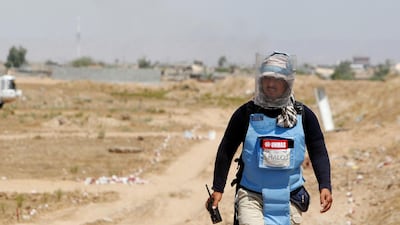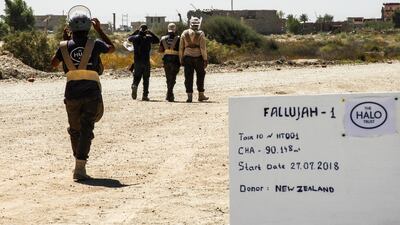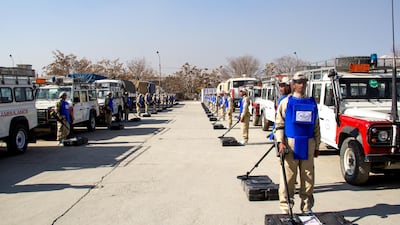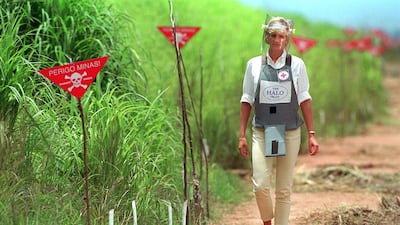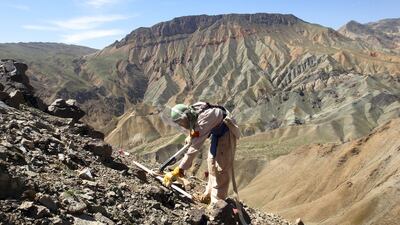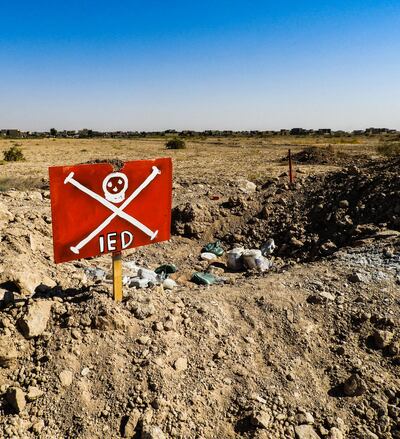It is slow and dangerous work. But each bomb cleared by Halo Trust’s explosive disposal team is a blow to ISIS recruitment and a step towards normality in war-torn nations around the world.
James Cowan, chief executive of the landmine clearance charity, has talked of how Halo's work in disposing of improvised explosive devices (IEDs) has dramatically cut the chances of vulnerable and destitute populations from being recruited into the ranks of extremists.
“If you don’t clear up IEDs then the population is forced to remain in refugee camps where they are radicalised or try their own de-mining with fatal results," he said. "Halo allows people to return home, children back to schools and business to reopen. This stops ISIS radicalisation in the camps.”
Two years into its operation in Iraq, Halo is making serious inroads into the country's deadly legacy from nearly two decades of conflict, recently clearing its 1,000th IED. Its 300 locally-recruited explosive experts have been involved in a massive clear-up operation of IEDs in Sunni cities including Fallujah, Ramadi, Baiji and Tikrit.
The charity first gained international recognition for its de-mining work in 1997 when the late Princess Diana walked in Halo protective kit across a minefield in Angola. Since then, it has grown into the world’s biggest explosive removal operator with a £100 million ($130m) budget and a mandate to clear IEDs, make safe ammunition stockpiles and advise governments. In a world of bombs and explosives, its never short of work.
“We are seeing IEDs being planted on a truly gigantic scale: you've got the proliferation of small arms, and a concentration of explosives in urban areas that we sadly saw in Beirut,” said Mr Cowan. “The range of ordnance is now much more complex than just simply landlines or IEDs with unexploded shells, rocketry and ammunition stockpiles.”
While Iraq has countless ‘legacy’ mines of its war with Iran, Halo’s work is focused on the big cities that are “absolutely covered in IED belts and improvised minefields” laid by ISIS.
Because of the number and nature of the IEDs, the charity has tailored its tactics, adopting a “mechanised approach” using armoured diggers to extract bombs from the ground and blow them up in place.
“The minefield outside Fallujah is six miles long and a couple hundred metres deep so you literally need to take an industrial approach to clearing the stuff,” Mr Cowan said. “If it detonates, it might damage the digger’s scoop, but it's not going to reach the actual cab itself.”
The former British Army officer sees Halo’s work as an important step to stabilising Iraq. “We can really help with getting the economy going and prevent further radicalisation because the son of Daesh is always lurking in the wings.”
There is still a “massive amount of work” for Halo to do, with new operations opening in Syria, Libya and Yemen.
But the charity has saved countless numbers of lives and limbs since its work began 32 years ago, clearing 1.7 million landmines and 12 million pieces of explosive ordnance.
Halo employs around 9,000 staff across 25 countries, training up local people to clear mines in their own communities. A third of its operators are now employed in Afghanistan where four decades of war has seen the country littered with millions of mines and IEDs. But like in Iraq, Halo's work is helpful in bringing peace to the region by offering Taliban fighters the potential for jobs. It is a policy that Mr Cowan believes could see Halo’s employees “expand tenfold” in Afghanistan to 30,000.
Accepted as impartial by both sides, Halo provides neutral ground with the Taliban co-operation in helping it locate and remove IEDs. “There’s plenty of areas in Afghanistan where everyone is agreed that these devices need to be gotten rid of.”
Mr Cowan is rightly proud of the charity's dangerous but vital work, that includes using drones with ground-penetrating radar to seek out danger spots. “We are stopping civilians and children being killed and we're creating jobs. What we take pride in is a reputation for being impartial and accepted by all sides of the Afghan conflict.” Mr Cowan also believes Halo can play the role of a “landing zone” for a potential peace deal.
“To me, a key part of it is that Afghan Taliban fighters are given an honourable livelihood," he said. "That means that they're not just getting laid off, becoming disaffected and joining a breakaway Taliban group. They're actually brought out of the fight and given something good to do.”
Since 1988, Halo has cleared 210,000 hectares of minefield and battlefield and more than 200,000 cluster munitions. While the organisation continues its dangerous role, Mr Cowan does not see business drying up any time soon. “This work is a bit like asking a doctor if no one will ever be sick again, sadly it will go on and on.”
